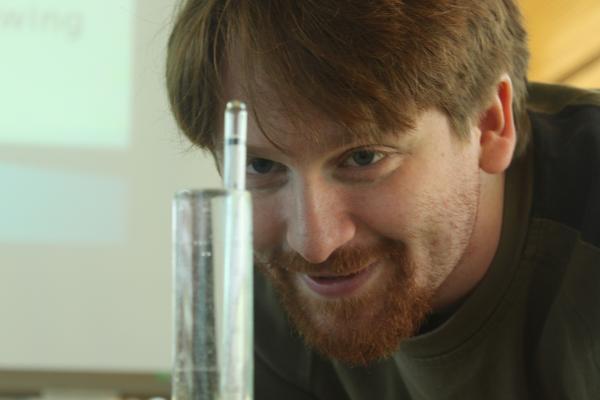KSA seminar teaches do-it-yourself beer-making
January 29, 2010 by Jacob Zinn · 2 Comments

Nathan Griffiths shows how to use a hydrometer to measure alcohol at the Cloverdale campus on Jan. 19. (Jacob Zinn photo)
Who needs a liquor license when students can make their own beer?
On Jan. 19, Nathan Griffiths of the KSA lead a home-brewing seminar at Kwantlen’s Cloverdale campus for about a dozen students, teaching them how to fermented lagers and ales.
“Beer is always popular, definitely an important part of social life,” said Griffiths, who had a copy of Homebrewing for Dummies. “I just wanted to kind of teach them the science and the process and the history, and of course, how to make it yourself for fun and save some money.”
For the KSA, teaching students to make beer is cheaper than getting a liquor license for a special event, which was a factor in making this first of four educational seminars.
Griffiths got into homebrewing after going to a you-brew business and learning the process of brewing batches of beer.
“I find it to be a much more social way to have friends over,” he said. “If they do a batch, I’ll do a batch and we can swap back and forth. That way, you’re not drinking half a keg of one type of beer.”
It’s illegal to distill hard alcohol, but making beer, wine and cider at home is permitted.
Griffiths recommends first-time brewers use a kit, which is often affordable and come with the ingredients needed to make beer: pre-mixed barley, hops, yeast and fine sugar. He stresses that the instruments must be sanitized because any bacteria can ruin a batch.
The process of homebrewing involves boiling sugar and the contents of a kit in water and leaving it in the primary fermenter for a week. Then it is moved into a secondary fermenter for another two to eight weeks (depending on the recipe) to make the beer more flavourful. Another cup of fine sugar is added to create carbonation and the beer is siphoned into bottles for one more week before consumption.
The temperature is also key during fermentation. Ales can be brewed at room temperature, but lagers should be kept at 10 C.
Events such as this are to being held to encourage student life on different campuses. Cloverdale has two more seminars: one on tenant’s rights and another on the B.C. Industry Training Authority for apprenticeships in different fields of work.


